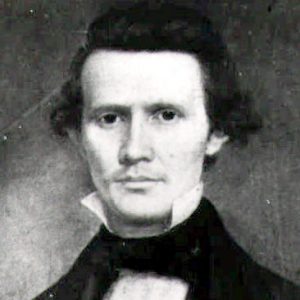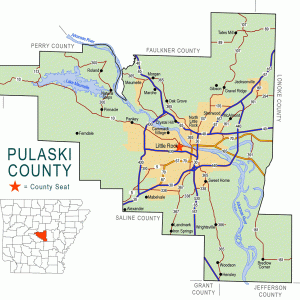calsfoundation@cals.org
McAlmont (Pulaski County)
McAlmont is an unincorporated community in Pulaski County, just to the east of North Little Rock (Pulaski County). Its southern boundary is Interstate 40, and the community is divided by tracks of the Union Pacific Railroad.
After Little Rock had become established as the capital of Arkansas, farmers began to cultivate land north of the Arkansas River from the capital city, establishing plantations to grow cotton and subsistence crops. Among the early landowners in the region that would be McAlmont were Charles Robinson, who first acquired a land patent in 1837 and added more land in 1842; David Spence (1838); Ephraim Beasley (1838); Edward Cook (1839); Lucy Beasley (1839); Kindred Delk (1842); and Littleberry M. Robinson (1842). The Southwest Trail ran through the area, linking the settlements to Missouri and Texas as well as to such Arkansas communities as Searcy (White County), Little Rock (Pulaski County), and Benton (Saline County). A school was established in 1836 for the children of the settlers; it was known as the Morning Glory School.
John Josephus McAlmont came to Arkansas in 1850. After living in Benton for two years, he relocated to Little Rock, where he worked as a doctor and also opened a pharmacy. McAlmont bought a house north of the Arkansas River along the Southwest Trail. When the Civil War broke out, McAlmont moved his family from its home at Third and Louisiana streets in Little Rock to his house across the river, about six miles away. During the war, the McAlmont family treated sick and wounded Confederate soldiers traveling the road past its house.
McAlmont was a major in the Confederate army, having participated in the groups that took possession of the Little Rock Arsenal and of Fort Smith. After the war, he was elected mayor of Little Rock, serving in that position in 1866 and 1867. He was also one of the founders of what would become the University of Arkansas for Medical Sciences (UAMS) in Little Rock.
After the war, many of the slaves who had worked on the plantations remained, some claiming land for themselves and their families and others living as tenant farmers, sometimes working for their former owners. Many of the African Americans in the region that was soon to be known as McAlmont worked as day laborers in the cotton fields. Some also grew vegetables on their own land and also raised cows, hogs, and chickens. Pulaski County High School opened for Black students in 1886. It was served by one teacher, W. Foster, under two directors, R. E. Holt and W. M. Vaughns.
Following the path of the Southwest Trail, the St. Louis, Iron Mountain and Southern Railway had been built through the area by 1874. It named its depot McAlmont, and the name has continued to be used into the twenty-first century. A post office was established in McAlmont in 1876; it closed in 1916. The high school was moved to the southern part of McAlmont (a neighborhood called Bookers’ Terrace, or simply Booker) in 1911 and was renamed Holt Training School. The next year, the school was destroyed by fire, but Principal P. J. Vanpelt saw that it was replaced with a two-story wood structure. It then became known as the Pulaski County Training School. The institution was renamed again in 1963, becoming Harris High School to honor Viola Harris, a school administrator.
Interstate 40 was built across Arkansas in the late 1950s and early 1960s. Passing just to the south of McAlmont, it brought more traffic through the area, including some vehicles that stopped at the crossing with Highway 161. A service station and several stores were built at the interchange. With the desegregation of Arkansas schools, Harris High School was closed in 1970. The building reopened as Harris Elementary School, which is part of the Pulaski County Special School District in the twenty-first century.
In the 2010 census, McAlmont had a population of 1,873, which included 1,472 African Americans, 330 whites, and sixty-five Hispanics. Several businesses are located in McAlmont on Highway 161, which runs parallel to the railroad tracks (now operated by Union Pacific).
Jeff Henderson, an athlete who was raised in McAlmont, won a gold medal in the 2016 Olympic Games.
For additional information:
Henker, Fred O. “John J. McAlmont: Physician, Druggist, Benefactor.” Pulaski County Historical Quarterly 46 (Winter 1998): 83–86.
Ramey, Samuel. “Arkansas community with roots in slavery still fighting for its rights.” People’s Tribune. March 1, 2017. https://peoplestribune.org/2017/03/arkansas-community-roots-slavery-still-fighting-rights/ (accessed November 21, 2025).
Steven Teske
Butler Center for Arkansas Studies






Comments
No comments on this entry yet.